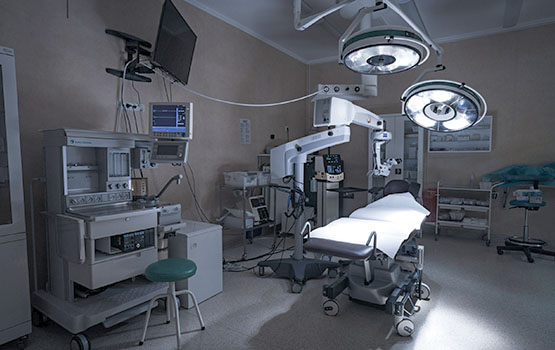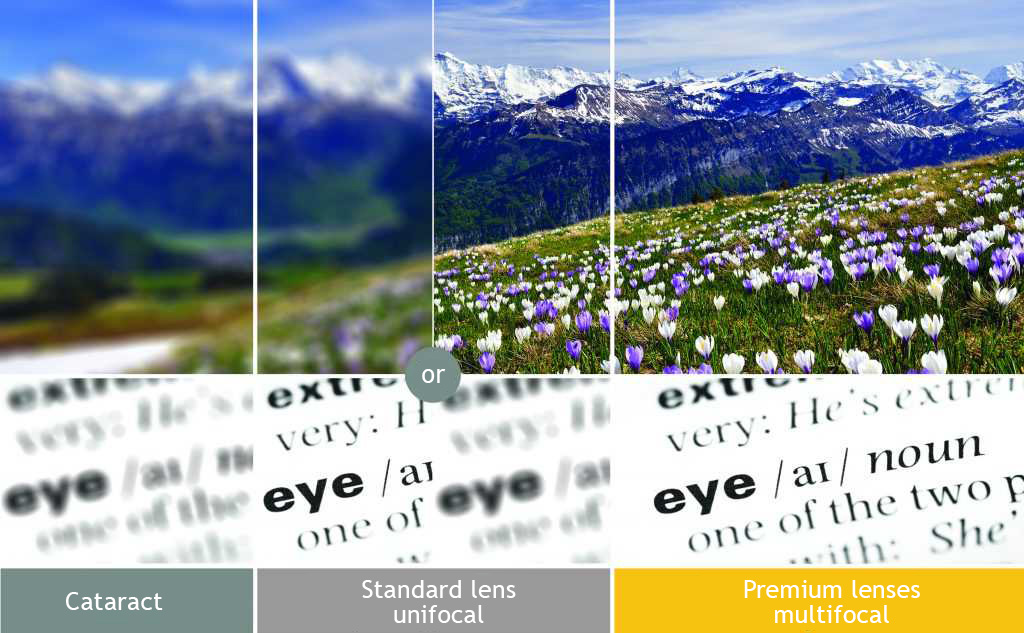An important moment in cataract surgery: lens selection
A cataract surgery is the most frequently conducted surgical procedure, during which the patient’s own lens, usually partially or completely opacified, is replaced with an artificial lens. It must be remembered that the artificial lens remains in the eye till the end of life. The scope of good vision depends on the type of the lens chosen. Patients can choose lenses from several dozen models available on the market, and a good decision is at the same time an investment, which may ensure even complete independence from glasses. Before making a decision which lens to choose, it is worth knowing all the benefits of the available models. Unfortunately, only unifocal (standard) lenses are reimbursed by the National Health Fund.


Unifocal lenses, reimbursed by the National Health Fund, provide good visual acuity at far distance, but for working at near distances, e.g. with a computer or for reading, corrective glasses will still be necessary. In the course of the surgery, by good selection of the lens strength, the existing vision defect, myopia or hyperopia, may be eliminated. However, if the patient has also astigmatism, then, after implantation of a standard lens, it will be still necessary to correct astigmatism with glasses, at all distances. Astigmatism correction with elimination of glasses for far distances is possible with a standard toric unifocal lens, but the National Health Fund reimburses only correction of astigmatism above 2 dioptres.
At OCHO we offer the most technologically advanced multifocal intraocular lenses, which enable correction of any vision defect. Premium IOLs allow for increased depth of acuity or good visual acuity for far, near and intermediate distances. Implantation of IOLs is performed at OCHO by leading surgeons from Poland and abroad. The lenses have additional blue or violet light filters, protecting the retina against harmful effects of light. The selection of an appropriate lens should take into account such factors as: lifestyle, type of work and activity, expectations with regard to the final effects, and financial possibilities. It must be remembered that technologically advanced Premium lenses are much more expensive than standard lenses, and that they are not reimbursed by the National Health Fund. At OCHO Medical Group, it is possible to use instalment payment for Premium lenses.
Lens selection is an investment for the whole life!
When choosing a lens, one must remember about all factors implying the final effect and comfort of use. Below we present the most important ones:
Cataract surgeries at OCHO
When you decide on Premium lenses, you should take special care not only to select a lens, but also a surgeon who will perform the lens implantation surgery. At OCHO, such procedures are performed by leading surgeons from Poland and abroad. The cooperation with Professor Takhtaev has resulted in the introduction of procedures which, on one hand, protect against the occurrence of secondary cataract, which is the most common complication of cataract surgery and particularly disturbs vision with multifocal lenses, but also, on the other hand, enable safe performance of procedures on both eyes on one day, which increases patient comfort and supports adaptation. Soon, we start cooperation with Professor Boris Malyugin, Director of the Fyodorov Institute in Moscow, and one of the best and most innovative surgeons in the world. He specialises in surgeries of the most complicated cataracts, where the risk of intraoperative complications is very high. In the case of uncomplicated cataracts, the risk is low, but depends primarily on the skills and experience of the surgeon, and it is many times lower with the best surgeons than with average and little experienced ones. That is why, the patient’s decision regarding both the surgeon, and the lens, is so important.
Financing of the procedure
Unfortunately, Premium lenses are not available as part of health insurance in most countries. In some countries, there is a possibility of extra charge for above-standard lenses, but it is currently impossible in Poland.
FAQ
During a basic ophthalmological visit, the patient’s ophthalmological history is taken, and the following examinations are conducted: autorefraction, keratometry, intraocular pressure measurement, visual acuity examination, slit lamp examination and fundoscopic examination.
In most cases, yes. If the doctor decides that some additional examinations are necessary, they may be performed during the visit, or if the doctor does not perform that kind of examinations, the patient is referred to another specialist.
An ophthalmological visit with performance of basic examinations lasts about 20 minutes. In some Centres, the examinations being part of the visit are performed by auxiliary personnel in the examination room. These activities are also included in the time of the basic visit.
Yes, it is recommended that contact lenses be removed before the visit. The patient should bring the lenses to the visit, since the doctor may ask the patient to insert them.
The cost of a visit is as per the price list on our website.
The waiting time for a private visit is up to a week. This time may be longer if the patient wants to see a particular specialist. The waiting time for a National Health Fund visit is according to the waiting list. Please call or e-mail us to appoint a specific date.
Yes, but you should inform the doctor that you would like to select glasses or lenses at the beginning of the visit.
Yes, you should normally apply your eye drops.
An ophthalmological visit does not require special preparation. If this is your first visit at the centre, you should have the identity card, which is necessary to create a patient record. Also remember that in most cases it is not allowed to drive a car after an ophthalmological visit.
During the first visit, the doctor takes the patient’s ophthalmological history. If the patient has any ophthalmological documentation from other institutions, it is worth taking it to the visit.
You can return to work/school after the ophthalmological visit, but please remember that if you received eye drops at the visit, your vision may be disturbed and blurred for about 2-3 hours.
Ophthalmological check-ups is an individual matter. The doctor usually informs the patient during the visit when he/she should return. Patients over 50 should have a check-up at least once a year.
If you received pupil-dilating drops at the visit, you must NOT drive a car directly after the visit. You should wait for about 2-3 hours.

